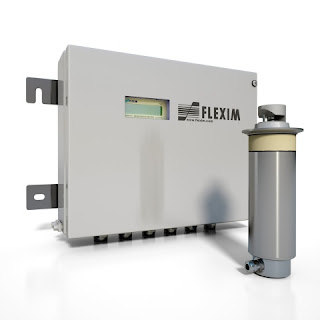 |
Hygienic process in-line refractometer
with control unit and flow cell
Courtesy Flexim |
Refractometry is a measuring technique that evaluates the impact of fluid media on light. There are some variants of the basic technology, but essentially it relies upon the media affecting a change in the way in which light waves propagate through a sample. This refraction caused by the sample can be compared to a known standard and information about the sample can be deduced.
Refractometry is a useful measuring method for many liquid processing operations. It is used for concentration and density analysis of process liquids. Portable sample processing units are available, but high volume continuous flow operations benefit from the use of in-line refractometers that do not require manual sampling and handling of process liquids. The measurements are produced in real time to continuously verify the fluid quality characteristics.
Food and beverage manufacturers use refractometry to determine the concentration of sugar, ethanol, ascorbic acid, pectin, artificial sweeteners and other components in their products. Close control of component concentration is a necessary part of delivering a consistent taste in finished products. Large investments are made to establish brand name products, and delivery of a consistent customer experience each time a product is consumed is key to developing and growing a brand. This is a solid example of a marketing based application of science and technology to industrial processing.
In-line refractometers for food and beverage applications will have specific features and construction to make them suitable for hygienic processing. The avoidance of contamination is first and foremost a requirement. Additionally, design features that reduce maintenance requirements and retain the needed measuring accuracy through extended periods of usage add value to the unit and should be a consideration when selecting an in-line refractometer.
Share your in-line refractometry applications and challenges with
product specialists, combining your process experience and knowledge with their product application expertise to develop effective solutions.

